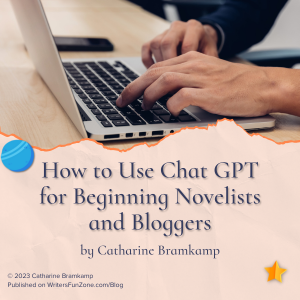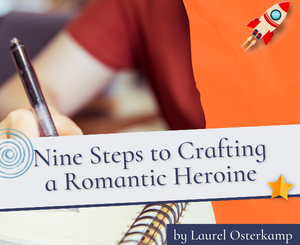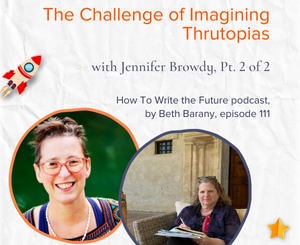Can You Write an Article in the Voice of a Creative Writer Explaining How to Use Chat GPT for Beginning Novelists and Bloggers? by Catharine Bramkamp
 Let’s welcome back monthly columnist Catharine Bramkamp as she shares with us “Can You Write an Article in the Voice of a Creative Writer Explaining How to Use Chat GPT for Beginning Novelists and Bloggers?” Enjoy!
Let’s welcome back monthly columnist Catharine Bramkamp as she shares with us “Can You Write an Article in the Voice of a Creative Writer Explaining How to Use Chat GPT for Beginning Novelists and Bloggers?” Enjoy!
***
The response from Chat GPT.
One of the biggest challenges of writing is figuring out what to write about.
ChatGPT can help you overcome writer’s block by generating creative writing prompts based on your preferences.
For example, you can ask ChatGPT to generate prompts for a specific genre, such as romance or horror, or based on a specific theme, like love or betrayal.
This can be a great way to get your creative juices flowing and come up with new and exciting ideas for your writing.
Get feedback on your writing
As a writer, it’s important to get feedback on your work to help you improve and grow. ChatGPT can be a valuable tool for receiving constructive criticism on your writing.
You can ask ChatGPT to review your writing and provide suggestions on how to improve it. This can include anything from grammar and syntax to character development and plot structure.
Just be sure to take the feedback with a grain of salt and use it as a tool for growth rather than a definitive judgment on your writing.
Use ChatGPT for character development
Creating compelling characters is essential to good storytelling, but it can be difficult to know where to start.
ChatGPT can help you brainstorm ideas for your characters, including their personalities, backstories, and motivations.
You can even ask ChatGPT to generate a character profile based on specific traits or characteristics you’re looking for.
This can be a great way to bring your characters to life and make them more relatable to your readers.
Get inspiration for blog posts
If you’re a blogger, ChatGPT can be a great tool for generating ideas for new blog posts.
You can ask ChatGPT to suggest topics based on your niche or industry, or even ask for ideas on how to make your blog more engaging and interactive.
ChatGPT can also provide you with helpful tips and strategies for growing your blog audience and increasing engagement.
Pretty good right?
ChatGPT – “Chat Generative Pre-trained Transformer” is a language model designed to generate human-like responses using “generative pre-training.”
That pre-training uses existing data, which, as is reasonable, is only found online. If information made it into the internet, ChatGPT can scrape it and produce answers.
- Sounds like we are out of a job right?
- Why not just ask for the Great American novel and call it a day?
- Or call it your life’s work created and finished courtesy of technology?
It’s Not Perfect
This current version of generative responses is both exciting and disturbing.
Exciting because now we have an instantaneous assistant to help with research and ideas. Disturbing because we’ve all read dystopian novels.
But not even ChatGPT suggests we take everything he/she says verbatim.
Think of the data, not only are vetted articles posted online, so are articles written by humans with less than stellar credentials. The bot will gather it all, privileging frequency both reliable and spurious.
So no, not all the research presented is accurate, or exactly what you want.
I’ll Tell You What I Want, What I Really, Really Want
How we get what we want out of Chat GPT is by asking the most specific and focused question we can create. Better questions produce more specific solutions.
For instance, in the self-help world, an unhelpful question is: Why am I such a failure?
A better question is: How can I improve the communication between me and my husband?
So too with these early versions of Chat GPT.
Don’t ask: write an article on self-help.
Rather ask: Can you write a self-help guide on marriage between a man and woman in the voice of Sylvia Plath?
Your results will be much, much better. Maybe.
The Elephant in the Room
No, ChatGPT cannot yet write the Great American Novel.
According to reviews written by humans, we can’t use the app to write a full novel.
Those rumors of authors who just plug in prompts (Can you write a novel in the voice of Sinclair Lewis with the theme loss and love?) and quickly publish the results are just that, rumors.
And for those intrepid bleeding edge authors who do slap up a derivative novella, the novel isn’t that good.
The AI has a limited amount of memory (ironic, I know) so apparently after around 3,000 words, an AI generated work will start to circle back on cliches and tired phrases because, of course, there are an abundance of cliches on the internet from which to choose.
How do we use this current version?
At this time, ChatGPT is great for research, experiments in character voice and idea generation.
The results are not 100% accurate, so like with any research, you need to know enough about your subject before you can ask a good question.
So too, you need to know enough about your research subject to recognize the errors in the ChatGPT responses.
Make sure the facts listed in a ChatGPT response are easily verifiable, the errors will be yours, you can’t get away with blaming the bot.
Chat GPT is not the complete solution to our creative writing needs.
I couldn’t even, in good conscience, publish the full article created by my question to Chat GPT because it wasn’t exactly right, and it wasn’t my style.
Don’t panic, there are a great many things AI can produce, our unique voice is not one of them.
***
Want to read more articles like this one Writer’s Fun Zone? Subscribe here.
***
ABOUT THE AUTHOR
 Catharine Bramkamp is a successful writing coach, Chief Storytelling Officer, former co-producer of Newbie Writers Podcast, and author of a dozen books including the Real Estate Diva Mysteries series, and The Future Girls series. She holds two degrees in English and is an adjunct university professor. After fracturing her wrist, she has figured out there is very little she is able to do with one hand tied behind her back. She delights in inspiring her readers.
Catharine Bramkamp is a successful writing coach, Chief Storytelling Officer, former co-producer of Newbie Writers Podcast, and author of a dozen books including the Real Estate Diva Mysteries series, and The Future Girls series. She holds two degrees in English and is an adjunct university professor. After fracturing her wrist, she has figured out there is very little she is able to do with one hand tied behind her back. She delights in inspiring her readers.






